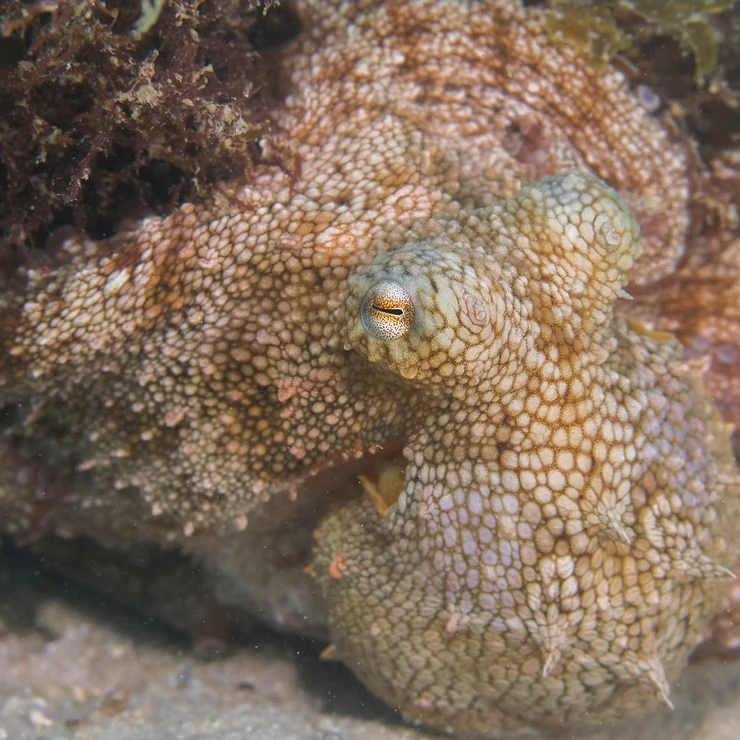Introduction
Octopuses have fascinated scientists, storytellers, and divers for centuries. With their mastery of camouflage, complex intelligence, and alien-like anatomy, they blur the line between science and mystery. Known as the “Curious Case of Octopuses,” their story explores survival strategies, cognitive abilities, cultural significance, and the urgent need for conservation. This article uncovers the enigma of these eight-armed marvels and why protecting them is critical to ocean health.
Key Takeaways
- Octopuses are unparalleled in camouflage, using color, texture, and behavior to become invisible.
- They exhibit advanced intelligence, including tool use, maze navigation, and escape artistry.
- A decentralized nervous system gives each arm semi-autonomous control.
- Research suggests they may experience emotions, showing curiosity and awareness.
- Conservation is crucial, as overfishing, habitat loss, and climate change threaten populations.
Masters of Disguise
The Art of Camouflage
Octopuses can vanish in seconds by shifting their skin’s color and texture. Specialized cells called chromatophores expand or contract to alter appearance, while iridophores and leucophores reflect light to perfect the illusion. They don’t just mimic rocks and corals—they copy the movements of fish and other marine creatures to fool predators.
- Chromatophores alter colors and patterns instantly.
- Iridophores and leucophores enhance reflection and scattering.
- Body shape changes complete the disguise.
Enigmatic Intelligence
Problem-Solving Skills
Octopuses are renowned for their problem-solving prowess. They use coconut shells as portable shelters, unscrew jars, and navigate mazes with surprising ease. Their adaptability showcases memory and learning rarely seen in invertebrates.
The Octopus Brain
Unlike humans, octopuses possess a central brain and mini-brains in each arm. This decentralized system allows independent movement, multitasking, and incredible responsiveness. Each arm can taste, touch, and react on its own, contributing to the octopus’s unmatched flexibility.
Blueprint for Survival
Suction and Sensation
Each tentacle is lined with hundreds of suckers, capable of gripping slippery prey and “tasting” the environment. This dual function enhances hunting and exploration.
Defensive Tactics
When threatened, octopuses release ink that obscures vision and confuses predators’ senses, buying precious seconds for escape. Combined with jet propulsion, this tactic ensures survival in hostile waters.
Emotions and Behavior
Though solitary by nature, octopuses display behaviors suggesting emotional intelligence. They respond to threats with color shifts, interact curiously with objects, and even show signs of play. While their inner lives remain mysterious, these actions hint at awareness beyond simple instinct.
Cultural Significance
Across cultures, octopuses have been cast as sea monsters, wise beings, and symbols of adaptability. In art and literature, they embody mystery, while in cuisine, they are celebrated as delicacies in regions like Japan, Korea, and the Mediterranean. This dual role—as both feared and revered—reflects humanity’s enduring fascination.
Conservation and the Future
Threats and Challenges
- Overfishing and bycatch reduce octopus populations.
- Pollution and habitat destruction threaten coastal ecosystems.
- Climate change disrupts breeding and food availability.
Protecting Octopuses
Marine protected areas, sustainable fishing practices, and ethical research are vital to ensuring their survival. Aquariums contribute by educating the public, conducting breeding programs, and rehabilitating injured octopuses.
Research Frontiers
New technologies such as DNA sequencing, biotelemetry, and underwater robotics are unlocking fresh insights into octopus cognition and communication. These advances could revolutionize neuroscience, robotics, and even artificial intelligence.
Conclusion
Octopuses remain an enigma—masters of disguise, problem solvers, and cultural icons. They challenge our assumptions about intelligence and consciousness, reminding us that many forms of life think, feel, and survive in extraordinary ways. Protecting them means protecting a vital piece of the ocean’s mystery and ensuring future generations can marvel at their brilliance.

